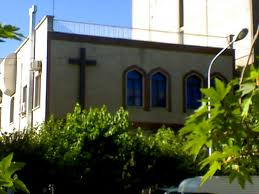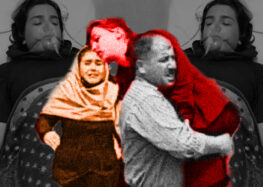Protestant Church Shutdown Sparks Fears of Coming Closure Spree

Central Assembly of God Church in Tehran, of which the recently closed Jannat Abad church operated as a branch. Credit: The Farsi Chrisitan News Network
(8 June 2012)- Iranian authorities should allow the Assembly of God church in western Tehran to reopen immediately, and should stop persecuting Persian-language churches, the International Campaign for Human Rights in Iran said today.
“The ability to join a church or mosque or temple is one of the most fundamental religious freedoms,” said Hadi Ghaemi, spokesperson for the Campaign. “This drive to close churches is an assault on free religious practice, in violation of Iran’s international commitments, and a sign of growing religious intolerance within the Iranian government.”
Iran’s Revolutionary Guard Intelligence Organization has recently and abruptly taken over the oversight of Christian churches in Iran, which were previously overseen by agents of the Ministry of Intelligence and the Ministry of Culture and Islamic Guidance, according to information received by the Campaign.
At the end of May 2012, Iranian authorities forced the Assembly of God church in the western Tehran neighborhood of Jannat Abad to close its doors and discontinue services, a local source with knowledge of the Iranian Protestant community told the Campaign.
According to the local source, the authorities told the church leaders, “You must close the church, and if you don’t do this and we have to formally close the church then there is no hope of you even keeping the building afterwards, to sell.”
The local source told the Campaign, “Because if [the authorities] shut down the church themselves then the government will confiscate the building.”
The Jannat Abad church held its last services on 28 May 2012, after having operated in the same building for over 15 years; the church gained ownership of the building five years ago. The church, which provided two services per week for 80 to 100 attendees, as well as prayer sessions and bible studies, is part of an international Protestant evangelical network called Assemblies of God. The Jannat Abad church operated with the full knowledge of Iranian authorities as a branch of the officially recognized Central Assembly of God Church in Tehran but was an independent ministry, sources told the Campaign.
In the past six months, authorities have reportedly shut down several other established Persian-language churches in Iran, arresting many of their members. Another Assembly church in the southern city of Ahvaz was shut down on 23 December 2011, just before Christmas. Authorities allegedly detained the church’s reverend, Farhad Sabok Rooh, along with his wife and two other church members, eventually releasing them on bail. On 22 February 2012, authorities arrested at least ten members of St. Peter’s Anglican church in Esfahan, including its pastor Hekmat Salimi, according to Iranian Christian news agencies. One detainee, a 78-year-old woman, was quickly released; the rest were held for nearly two months before being freed on bail.
“The church’s work was a hundred percent spiritual. They had no attachment to any agencies, organizations, or political groups. And all their activities and budget came from the donations of their congregation,” the source added.
While some existing churches are facing closure in Iran, no new churches have been able to obtain licenses from the Minister of Culture and Islamic Guidance since the 1979 revolution. The Jannat Abad Assembly of God church conducted its services in the Persian language.
The Campaign’s research for an upcoming report on the persecution of Protestant Christians in Iran indicates that the Iranian government has targeted churches which operate in Persian and evangelize, largely to prevent Muslims from learning about or converting to Christianity. Several Iranian church leaders told the Campaign that around 2005, coinciding roughly with the election of President Mahmoud Ahmadinejad, the government ramped up its repression of Protestant groups, and since 2009 the arrests of church members and limitations on churches have increased markedly.
Iranian Christian rights activists told the Campaign they fear the Jannat Abad closure marks a particular threat to all established Persian-language churches in the country.
The local source noted that Iran’s Revolutionary Guard Intelligence Organization was instrumental in shutting down the Jannat Abad church. Several on-the-ground sources have reported that in the past month the Revolutionary Guard (IRGC) has assumed responsibility for overseeing church activities in Tehran, the director of the Iranian Christian news agency Farsi Christian News Network (FCNN) told the Campaign.
“In the past month, all of a sudden the individual government agents responsible for contacting church leaders and giving them orders in Tehran changed,” FCNN’s director said. “Prior to this, the people who did this work were experts in Iranian minority groups from the Ministry of Culture and Islamic Guidance and Ministry Intelligence. The new people who appear to [oversee churches] introduce themselves as agents of the Revolutionary Guard.”
The IRGC is a parallel military and intelligence agency under the direct control of Iran’s Supreme Leader, and outside the control of the executive branch of the government.
“The Revolutionary Guard’s new role demonstrates that the government is likely intensifying its efforts to exert control over Persian-language churches,” said Ghaemi. “We fear that if the international community does not speak up, we will see more church closures and more limits of religious choice in the future.”
“Sadly, this move against Protestants mirrors the Iranian government’s effort to suppress many religious groups and religious leaders, including Baha’is, Sufi and Sunni Muslims, and even Shia Muslim clerics, who possess views that differ from those of the government,” added Ghaemi.






